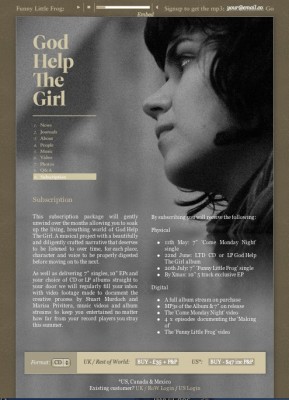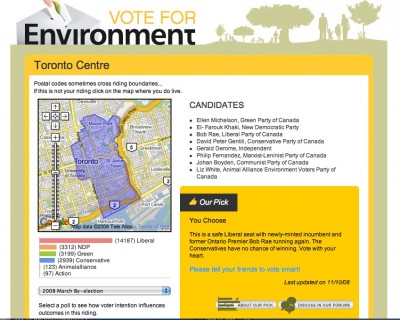Crossposted on Rhizomicomm.
Most people don’t know who Carl Malamud is and probably don’t care, but he’s the guy who wants the US Patent & Trademark Office and the National Archives and Records Administration to offer up its bulk data for free. The idea is by allowing open access, non-profits and third-parties will use new technologies like Web 2.0 to create wikis and applications, allowing for better transparency and value-creation.
Web 2.0 & the Free
Yesterday, I blogged about intellectual property {IP} in a global context with pricing pressures towards the free. In an era of piracy and difficult enforcement of IP rights, what’s an IP producer to do? The “work” must be a part of a model that generates value. Today, in my inbox I received an announcement from the God Help the Girl project, a “story set to music” envisioned by Glasweigian Stuart Murdoch of Belle & Sebastian fame. There was an announcement about a BBC4 documentary on the band airing in the UK and a mention of how fans can “subscribe” to the music on their website::

Those familiar with B&S know of Stuart Murdoch’s entrepreneurial roots. The band starting off as a college course project and going viral in 1996-97 is a story that DIY indie rock legends are made of. So, it should come as no surprise that Murdoch is on top of the Web 2.0 concept of the “free.” Sure, you can hear the track “Funny Little Frog” on the site and see videos on YouTube for free, but the die hard fan can experience God Help the Girl directly in their mailboxes and inboxes for $47US in North America or £40.50 in the UK. The idea here is to go beyond the song as a digital commodity, but the creation of value and meaning to people that gets them to subscribe. The “free” stuff is the hook. The danger is offending fans with a seemingly-blatant cashgrab, territory in which The Pixies have ventured in.
Gov 2.0
While some corners of indie music are catching on to Web 2.0, what about government? Will the government see that they would serve the public good by creating value through the availability of free access to Federal databases? The Obama administration has promised openness and transparency, but what are the current realities? Unfortunately, the US agencies in question that Malamud is fighting aren’t always interested in free. There are prohibitive paywalls for annual subscriptions to the federal regulations and patent databases to the tune of $17,000US and $39,000US, respectively. The US government isn’t making a lot of money off of this, which begs the question why the high prices? It makes one suspect that the corporate interests have a vested interest in maintaining an information oligarchy with the government’s support. While this may be a case of negligent gatekeepers, I’ve heard anecdotal tales of US Department of Labor data being suppressed for political reasons and have seen access granted to “restricted” data based on social ties.
Opening up these databases will likely see a flurry of usage, usage of data that’s public. If Malamud gets his way, in the future if you need government data on such-and-such, there’d be an app for that. Ideally.
Canadian Example
Up here in Canada, I came across a data barrier with respect to Federal electoral ridings {districts} and postal codes. So, if a non-profit is interested in doing an advocacy campaign where voters can e-mail Federal candidates for Parliament, there’s a pricetag on that public data. The cost from Statistics Canada is $3,000 CAN, which doesn’t seem like a lot, but it’s sufficient enough to be a barrier for many nonprofits and smaller colleges. A UK company, Advocacy Online, is utilized by some organizations needing this data, turning the cost barrier into a revenue stream for them. Should this data be free? Wouldn’t that serve the public good, as we would see more and more usage and possibly more civic engagement?
The handwriting is on the wall regarding the power of data access in Canada. In the last Canadian federal election, VoteforEnvironment created a mashup of election data, riding data, postal code data, and Google maps. This allowed users to make better, data-driven choices about strategic voting, where voters make their choices on the basis of how their vote affects Parliamentary makeup, not on the basis of party. The implications according to CBC are compelling::
“If every green voter followed the website’s suggestions (as of Saturday), it says that instead of electing a Conservative minority of 141 MPs to 73 Liberals, 57 Bloc, 35 NDP, and no Greens, the electoral result would shift to a Liberal minority with 109 MPs to 97 Conservatives, 53 Bloc, 46 NDP, and one Green.”
Here in Toronto Centre, when you punch in the postal code on the VfE, voters get a summary and their anti-Tory recommendation. Ex-Dipper Bob Rae has a safe seat as a Liberal candidate, so the recommendation is to vote your conscience.

Tim O’Reilly has a few interesting ideas on Gov 2.0. It’s a time for fewer barriers, including those of cost. If any data should be free, shouldn’t it be public data?
Twitterversion:: Will free access to Federal data enable #Gov2.0, increase transparency, & civic engagement?Implications for US & #Canpoli http://url.ie/23qx @Prof_K
Song:: Funny Little Frog – God Help The Girl

Comments 3
rkatclu — July 22, 2009
Wired has articles on Malamud from time to time.
Even more egregious than regulations and patents (in my opinion) is the PACER paywall copyrighting state/local laws.
rkatclu — July 22, 2009
Correction:
Previous post should read "PACER paywall and copywriting state/local laws."
Kenneth M. Kambara — July 23, 2009
RK:: Thanks for the heads-up. This is a great quote by Grimmelmann:: "If there are secret laws, it's really hard to say that those are laws in any meaningful sense at all...There are lots of areas of law in which the statute is very short, but the case law is incredibly long and important." The "information oligarchy" is really trying to preserve its position re: PACER, in my book.
On another note, you might find this davidwiner Tweet to be interesting. He talks about paywalls and journalism:: RT: @davewiner What worked for HBO won't work for news (Scripting News). http://tr.im/tGCx